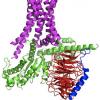Is there any way to disable REM sleep without the use of Antidepressants?

#1
Posted 18 November 2015 - 09:36 PM
#2
Posted 18 November 2015 - 10:48 PM
clonidine:
Effect of Clonidine in Obstructive Sleep Apne
ABSTRACT
Effect of Clonidine in Obstructive Sleep Apnea. Available from: http://www.researchg...ive_Sleep_Apnea [accessed Nov 18, 2015].
#3
Posted 19 November 2015 - 09:59 PM
clonidine:
Effect of Clonidine in Obstructive Sleep Apne
Faculty of Medicine, University of Calgary, Alberta, Canada.The American review of respiratory disease (Impact Factor: 10.19). 03/1992; 145(2 Pt 1):435-9. DOI: 10.1164/ajrccm/145.2_Pt_1.435Source: PubMedABSTRACT
The current treatment of choice for obstructive sleep apnea is continuous positive airway pressure. However, not all patients tolerate this form of therapy. We evaluated the effect of clonidine hydrochloride, an alpha 2-adrenergic agonist with REM-suppressant activity, in eight male patients with obstructive sleep apnea. In each patient, sleep-stage distribution and breathing pattern in two all-night sleep studies performed during a 10-day course of clonidine were compared with those of two control and two placebo nights. A dose of 0.2 mg of clonidine administered orally at bedtime totally suppressed REM sleep in two patients. In the other six patients, the same dose decreased percent time spent in REM sleep from a control of 13.4 +/- 1.0 to 8.6 +/- 1.4% (mean +/- SEM, p less than 0.05). The latency to REM sleep increased in the latter group from a control of 129 +/- 9 to 308 +/- 24 min (p less than 0.001). Clonidine had no effect on the frequency and duration of non-REM breathing abnormalities. Under clonidine, the level of nocturnal hypoxemia improved in six patients. This was due to a total suppression of REM and the consequent lack of REM apneas in two patients. In four patients, upper airway obstruction disappeared during period of unsuppressed REM sleep, and SaO2 remained above 90% throughout this sleep stage. Clonidine transformed the pattern of sleep-disordered breathing during unsuppressed REM in the other two patients from that of repetitive obstructive hypopneas associated with persistent hypoxemia to occlusive apneas and cyclical hypoxemia. These results were observed consistently in all patients during both clonidine-sleep studies.(ABSTRACT TRUNCATED AT 250 WORDS)Effect of Clonidine in Obstructive Sleep Apnea. Available from: http://www.researchg...ive_Sleep_Apnea [accessed Nov 18, 2015].
Intersting this is the exact reason I needed it for, not sure if I will be able to get an ADHD diagnosis though.
#4
Posted 19 November 2015 - 10:49 PM
clonidine:
Effect of Clonidine in Obstructive Sleep Apne
Faiq G. Issa
Faculty of Medicine, University of Calgary, Alberta, Canada.The American review of respiratory disease (Impact Factor: 10.19). 03/1992; 145(2 Pt 1):435-9. DOI: 10.1164/ajrccm/145.2_Pt_1.435
Source: PubMed
ABSTRACT
The current treatment of choice for obstructive sleep apnea is continuous positive airway pressure. However, not all patients tolerate this form of therapy. We evaluated the effect of clonidine hydrochloride, an alpha 2-adrenergic agonist with REM-suppressant activity, in eight male patients with obstructive sleep apnea. In each patient, sleep-stage distribution and breathing pattern in two all-night sleep studies performed during a 10-day course of clonidine were compared with those of two control and two placebo nights. A dose of 0.2 mg of clonidine administered orally at bedtime totally suppressed REM sleep in two patients. In the other six patients, the same dose decreased percent time spent in REM sleep from a control of 13.4 +/- 1.0 to 8.6 +/- 1.4% (mean +/- SEM, p less than 0.05). The latency to REM sleep increased in the latter group from a control of 129 +/- 9 to 308 +/- 24 min (p less than 0.001). Clonidine had no effect on the frequency and duration of non-REM breathing abnormalities. Under clonidine, the level of nocturnal hypoxemia improved in six patients. This was due to a total suppression of REM and the consequent lack of REM apneas in two patients. In four patients, upper airway obstruction disappeared during period of unsuppressed REM sleep, and SaO2 remained above 90% throughout this sleep stage. Clonidine transformed the pattern of sleep-disordered breathing during unsuppressed REM in the other two patients from that of repetitive obstructive hypopneas associated with persistent hypoxemia to occlusive apneas and cyclical hypoxemia. These results were observed consistently in all patients during both clonidine-sleep studies.(ABSTRACT TRUNCATED AT 250 WORDS)
Effect of Clonidine in Obstructive Sleep Apnea. Available from: http://www.researchg...ive_Sleep_Apnea [accessed Nov 18, 2015].
I wonder if guanfacine would have similar effects??
#5
Posted 19 November 2015 - 11:00 PM
Guanfacine has an effect on REM, but at higher dosages and with an weaker effect than clonidine:
Br J Clin Pharmacol. 1980;10 Suppl 1:165S-168S. Central effects of guanfacine and clonidine during wakefulness and sleep in healthy subjects.Abstract1. Three double-blind studies in young normotensive male volunteers were carried out: a study in ten awake subjects, comparing guanfacine 2.0 and 4.0 mg with clonidie 0.15 and 0.30 mg and placebo; and two polygraphic sleep studies each with six subjects, comparing guanfacine 1.0 and 2.0 mg with placebo, and clonidine 0.15 and 0.30 mg with placebo, respectively. 2. In awake subjects, both drugs reduced systolic blood pressure without significantly altering diastolic blood pressure, pulse rate and objective performance parameters. 'Side-effects' such as tiredness, decreased inclination to work, and dryness of the mouth were somewhat more frequent after the higher clonidine dose than after both doses of guanfacine, and peaked 2 h after clonidine but only 4-6 h after guanfacine. 3. Clonidine 0.15 and 0.30 mg given in the evening was followed by a substantial and dose-dependent reduction in rapid eye movement (REM) sleep. Guanfacine 1.0 mg did not alter REM sleep and 2.0 mg of guanfacine had less effect than both doses of clonidine in this respect. Clonidine's effect on REM sleep began after about 2 h, whereas guanfacine's action on REM sleep began 5 h after the dose. 4. Guanfacine and clonidine possess a qualitatively similar pattern of activity with regard to the parameters studied; but the central effects are less pronounced and occur later after guanfacine than after clonidine in equiactive doses.
Edited by Guinga, 19 November 2015 - 11:01 PM.
Also tagged with one or more of these keywords: sleep
1 user(s) are reading this topic
0 members, 1 guests, 0 anonymous users


















































